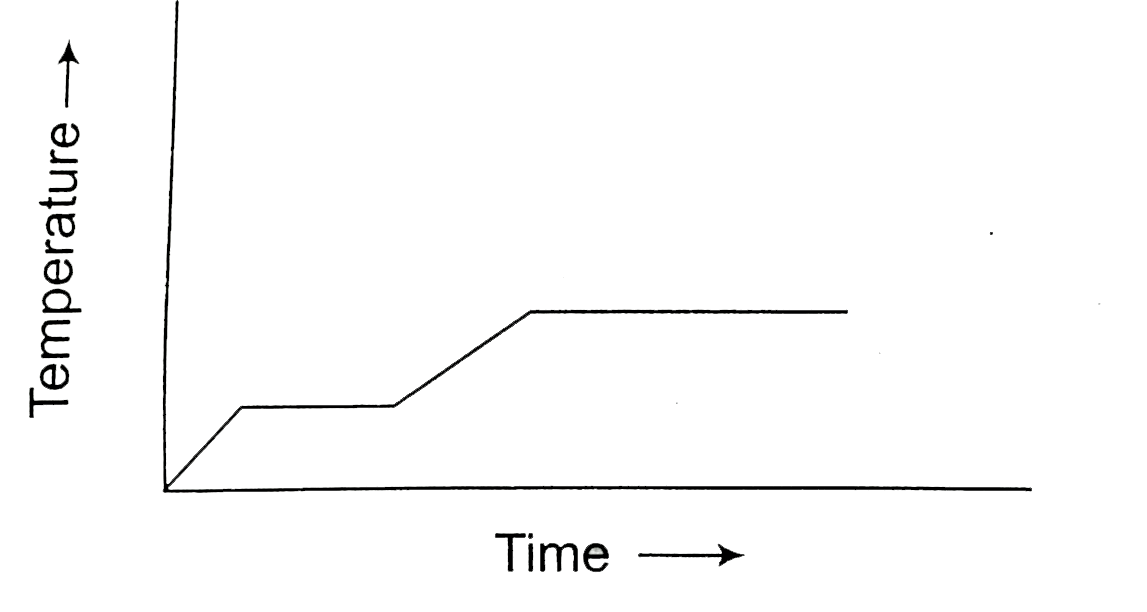The greater the mass of a body , the greater is its latent heat capacity. Is this true of false?
To determine whether the statement "The greater the mass of a body, the greater is its latent heat capacity" is true or false, we can analyze the definitions and relationships involved in latent heat capacity.
1. Understanding Latent Heat Capacity:
- Latent heat capacity is defined as the amount of heat required to change the phase of a given mass of a substance (m grams) without changing its temperature.
- Mathematically, it can be expressed as:
L=Qm
where L is the latent heat capacity, Q is the heat absorbed or released, and m is the mass of the substance.
2. Understanding Specific Latent Heat Capacity:
- Specific latent heat capacity refers to the heat required to change the phase of a unit mass (1 gram) of a substance.
- It is a property of the material itself and is denoted as Ls. The relationship is:
Q=Ls×m
- Here, Ls remains constant for a given substance regardless of the amount of substance.
3. Analyzing the Relationship:
- If we have a mass m of a substance, the heat required to change its phase is Q.
- If we double the mass to 2m, the heat required will also double, i.e., Q′=Ls×2m.
- This shows that as the mass increases, the total heat required (latent heat capacity) increases proportionally.
4. Conclusion:
- Since the heat required to change the phase of a substance increases with an increase in mass, we conclude that:
Greater the mass of a body, greater is its latent heat capacity.
- Therefore, the statement is True.
Final Answer:
The statement "The greater the mass of a body, the greater is its latent heat capacity" is True.
---
- Latent heat capacity is defined as the amount of heat required to change the phase of a given mass of a substance (m grams) without changing its temperature.
- Mathematically, it can be expressed as:
L=Qm
where L is the latent heat capacity, Q is the heat absorbed or released, and m is the mass of the substance.
- Specific latent heat capacity refers to the heat required to change the phase of a unit mass (1 gram) of a substance.
- It is a property of the material itself and is denoted as Ls. The relationship is:
Q=Ls×m
- Here, Ls remains constant for a given substance regardless of the amount of substance.
- If we have a mass m of a substance, the heat required to change its phase is Q.
- If we double the mass to 2m, the heat required will also double, i.e., Q′=Ls×2m.
- This shows that as the mass increases, the total heat required (latent heat capacity) increases proportionally.
- Since the heat required to change the phase of a substance increases with an increase in mass, we conclude that:
Greater the mass of a body, greater is its latent heat capacity.
- Therefore, the statement is True.
The statement "The greater the mass of a body, the greater is its latent heat capacity" is True.
Topper's Solved these Questions
- CALORIMETRYBook:CENGAGE PHYSICS ENGLISHChapter:CALORIMETRYExercise:Exercise 1.2
Explore 22 Videos
- CALORIMETRYBook:CENGAGE PHYSICS ENGLISHChapter:CALORIMETRYExercise:Exercise 1.3
Explore 18 Videos
- CALORIMETRYBook:CENGAGE PHYSICS ENGLISHChapter:CALORIMETRYExercise:Solved Example
Explore 13 Videos
- BASIC MATHEMATICSBook:CENGAGE PHYSICS ENGLISHChapter:BASIC MATHEMATICSExercise:Exercise 2.6
Explore 20 Videos
- CENTRE OF MASSBook:CENGAGE PHYSICS ENGLISHChapter:CENTRE OF MASSExercise:INTEGER_TYPE
Explore 1 Video
Similar Questions
The greater the mass of a body the greater is its heat capacity is this true of false?
View SolutionThe greater the mass of a body, the greater is its specific heat capacity. True of false?
View SolutionThe mass of a body is less in a mine. Is it true?
View SolutionThe centre of mass of a rigid body always lies inside the body, Is this statement true or false?
View SolutionAll the particles of body are situated at a distance R from the origin. The distance of the centre of mass of the body from the origin is also R. Is this statement true or false?
View SolutionHow is the heat capacity of the body related to its specific heat capacity ?
View SolutionThe heat capacity of a body depends on
View Solution
Heat is supplied to a certain homogeneous sample of matter, at a uniform rate. Its temperature is plotted against time, as shown Which of the following conclusions can be drawn?
(i) Its specific heat capacity is greater in the solid state than the liquid state.
(ii) Its specific heat capacity is greater in the liquid state than in the solid state.
(iii) Its latent heat of vaporization is greater than its latent heat of fusion.
(iv) Its latent heat of vaporization is smaller than its latent heat of fusion
View SolutionUnder forward slip condition, translational kinetic energy of a ring is greater than its rotational kinetic energy is this statement true of false?
View SolutionIs the specific heat of water greater than that of sand?
View Solution